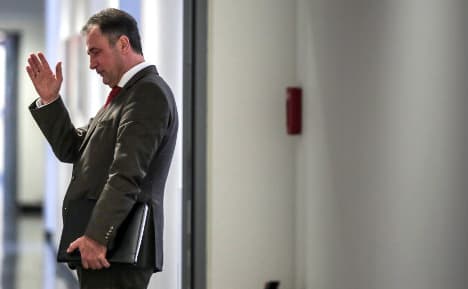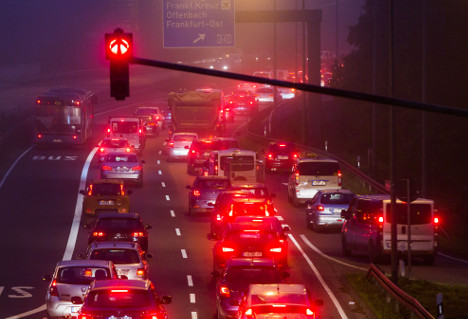Train drivers say strike to end Saturday evening

UPDATE: Train drivers' union (GDL) leader Claus Weselsky said on Friday that his members would return to work at 6 pm on Saturday, ending their strike 34 hours earlier than planned.
The news came shortly after a labour court in Frankfurt rejected a second attempt by rail operator Deutsche Bahn (DB) to have the strike declared unlawful.
"We could have continued the strike until 4am on Monday," Weselsky said, but the train drivers wanted to make a "gesture of reconciliation".
The union had previously refused a plea from DB not to disrupt the celebrations of the 25th anniversary of the fall of the Berlin Wall on Sunday.
"This is a good sign for our customers and for our workers," DB head of human resources Ulrich Weber said, arguing that the union's concession showed the court proceedings had been worthwhile.
SEE ALSO: Ten ways to get around without trains
DB had filed an injunction with the labour court to force drivers back to work, arguing a 98-hour strike, which was scheduled to last until 4am Monday, was disproportionate.
But the court said the strike had been organized according to the rules and there was no reason to stop it going ahead.
“DB feels that it has a duty to appeal against the decision in the first instance,” the company announced as it brought the case to the Hesse state court.
In a show of strength, around 500 striking train drivers and supporters rallied in Berlin on Friday lunchtime outside Deutsche Bahn's head offices on Potsdamer Platz.

GDL's main demand is that it be allowed to represent a larger cross-section of rail staff, especially on-board staff, in wage negotiations, staking a claim to some who are currently represented by larger union EVG.
They also want a five percent pay increase and a two-hour cut to the working week.
The union's refusal to back down had taken its toll on the sympathy of passengers. Fifty-one percent of people said they did not sympathize with the strikers in a poll by broadcaster ARD on Thursday, up from 41 percent in October.
The walkout began at 3pm on Wednesday for freight services and at 2am on Thursday for passenger trains.

Around one-third of trains were running on Thursday, although cancellations were spread unevenly around the rail network.
Regional and S-Bahn trains were hit harder than long-distance services, with Eastern states, where more drivers are GDL members, suffering from especially large numbers of cancellations.
Up to 85 percent of regional trains were cancelled in the East, compared with 60 percent in the South and 70 percent in the North and West.
And 12 of the 28 ICE (Intercity) lines were at a complete standstill.
While larger cities including Berlin, Hamburg, Frankfurt and Munich have regular departures, others, such as Dresden, were almost totally cut off.
U-Bahns and trams are not affected by the strike but are exceptionally busy. The lack of trains has also led to congestion on the roads.

Information about the emergency timetable is available at the Deutsche Bahn website or via their free hotline on 08000 99 66 33.
Comments
See Also
The news came shortly after a labour court in Frankfurt rejected a second attempt by rail operator Deutsche Bahn (DB) to have the strike declared unlawful.
"We could have continued the strike until 4am on Monday," Weselsky said, but the train drivers wanted to make a "gesture of reconciliation".
The union had previously refused a plea from DB not to disrupt the celebrations of the 25th anniversary of the fall of the Berlin Wall on Sunday.
"This is a good sign for our customers and for our workers," DB head of human resources Ulrich Weber said, arguing that the union's concession showed the court proceedings had been worthwhile.
SEE ALSO: Ten ways to get around without trains
DB had filed an injunction with the labour court to force drivers back to work, arguing a 98-hour strike, which was scheduled to last until 4am Monday, was disproportionate.
But the court said the strike had been organized according to the rules and there was no reason to stop it going ahead.
“DB feels that it has a duty to appeal against the decision in the first instance,” the company announced as it brought the case to the Hesse state court.
In a show of strength, around 500 striking train drivers and supporters rallied in Berlin on Friday lunchtime outside Deutsche Bahn's head offices on Potsdamer Platz.

GDL's main demand is that it be allowed to represent a larger cross-section of rail staff, especially on-board staff, in wage negotiations, staking a claim to some who are currently represented by larger union EVG.
They also want a five percent pay increase and a two-hour cut to the working week.
The union's refusal to back down had taken its toll on the sympathy of passengers. Fifty-one percent of people said they did not sympathize with the strikers in a poll by broadcaster ARD on Thursday, up from 41 percent in October.
The walkout began at 3pm on Wednesday for freight services and at 2am on Thursday for passenger trains.

Around one-third of trains were running on Thursday, although cancellations were spread unevenly around the rail network.
Regional and S-Bahn trains were hit harder than long-distance services, with Eastern states, where more drivers are GDL members, suffering from especially large numbers of cancellations.
Up to 85 percent of regional trains were cancelled in the East, compared with 60 percent in the South and 70 percent in the North and West.
And 12 of the 28 ICE (Intercity) lines were at a complete standstill.
While larger cities including Berlin, Hamburg, Frankfurt and Munich have regular departures, others, such as Dresden, were almost totally cut off.
U-Bahns and trams are not affected by the strike but are exceptionally busy. The lack of trains has also led to congestion on the roads.

Information about the emergency timetable is available at the Deutsche Bahn website or via their free hotline on 08000 99 66 33.

Join the conversation in our comments section below. Share your own views and experience and if you have a question or suggestion for our journalists then email us at [email protected].
Please keep comments civil, constructive and on topic – and make sure to read our terms of use before getting involved.
Please log in here to leave a comment.